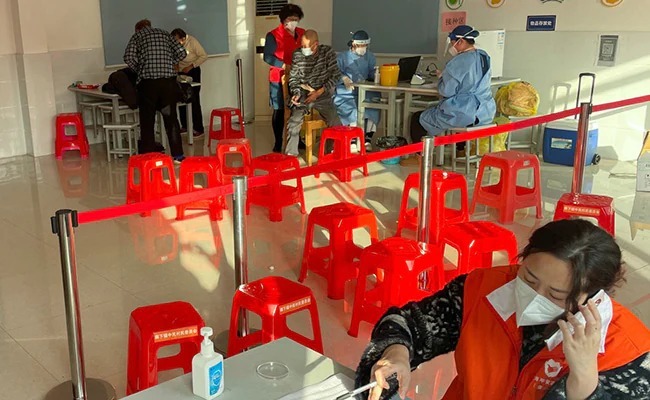| Translate This News In |
|---|
Following a sudden change in the nation’s containment tactics, cities in China started offering free anti-fever medications to the general population as COVID-19 spreads over the most populous nation in the world completely unchecked for the first time.
China started dismantling its “zero-COVID” policy last month following massive protests and a steady increase in cases.
Nevertheless, the nation has officially reported 5,241 deaths since the pandemic started in early 2020, a small number compared to what much less populated nations experienced.
China reported no new COVID fatalities for the second day in a row on December 21, despite the fact that funeral home employees claim there has been an increase in demand and waiting times for their services in recent days, which has resulted in increased prices. As of Tuesday, 389,306 instances with symptoms have been confirmed nationwide.
But analysts claim that because fewer tests are being conducted across China as a result of the most recent relaxation of regulations, official data are no longer a trustworthy indicator.
The Shanghai Deji Hospital predicted there were 5.43 million positives in the city and that half of the 25 million residents of China’s major business hub would contract the disease by the end of the year in a post on its official WeChat account.
The hospital warned that this year’s Christmas Eve, New Year’s Day, and the Lunar New Year would all be risky.
“In this awful struggle, Greater Shanghai as a whole will perish, and we will infect the entire hospital staff! The entire family will be infected by us! Everyone of our patients will be infected! We are powerless and unable to flee.
Experts predict that China could experience more than a million COVID fatalities in 2013.
The chief of the World Health Organization stated that the organisation is worried about the rise in infections and that it supports the government’s decision to concentrate on immunising individuals who are most at risk.
In order to conduct a thorough review, the WHO’s director-general Tedros Adhanom Ghebreyesus told reporters that the organisation needed more specific data on illness severity, hospital admissions, and needs for intensive care units.
Free drugs
With hospitals frantically searching for beds and blood, pharmacies for medications, and authorities rushing to construct specialised clinics, China’s policy U-turn caught a frail health system off guard.
State media said that drug shortages were being addressed by local governments, and that pharmaceutical firms were putting in special effort to increase supplies.
A total of 100,000 ibuprofen tablets have arrived in Dongguan, a large city in southern China, and will be handed to 41 state drug stores this week before being made freely available, according to the Global Times.
Since December 17, 3 million ibuprofen tablets have been delivered to hospitals and retail pharmacies daily in Wuhan, the country’s capital and the location of the virus’s initial discovery in late 2019.
Authorities have arranged for free drug distribution at 18 pharmacies in Sanya, on the southern Hainan island. When a person shows their ID card, pharmacies in Zhoukou will provide them up to 10 free tablets every day.
Shenzhen, a major tech hub in China located north of Hong Kong, announced on Wednesday that it was dividing medicine packages and test kit batches into smaller batches than initially anticipated in order to sell to more customers. It stated that the batches will supply enough anti-fever medication for three days.
Germans’ mRNA Vaccines
Only deaths brought on by pneumonia and respiratory failure following a COVID infection are counted as COVID fatalities in China.
The move, according to disease experts outside of China, will understate the impact of the virus. Other commonly recognised types of potentially fatal COVID consequences include blood clots, heart attacks, sepsis, and kidney failure.
Germany said that it has delivered its first batch of BioNTech COVID vaccines to China, where German expats would receive them first. Berlin is urging the government to enable other foreign nationals to take them.
The first mRNA vaccinations to be made available in China were delivered at an unknown time and in an unknown quantity.
Nine COVID vaccines produced domestically and authorised for use in China. As Pfizer-BioNTech and Moderna have offered boosters in several nations, none has been upgraded to tackle the extremely contagious Omicron form.
According to some Chinese analysts, the COVID wave will peak in late January, and by late February or early March, things should be back to normal.


















